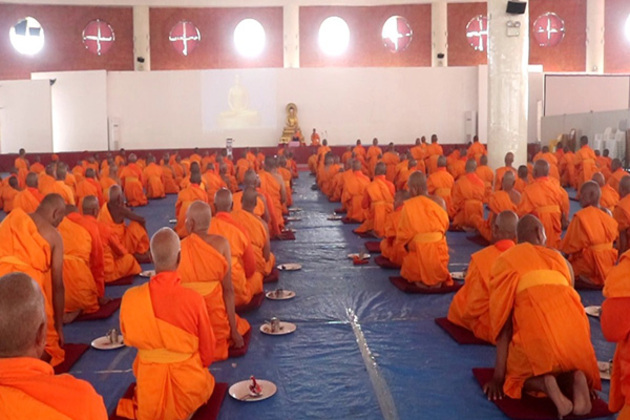Study finds extreme temperatures fuel online hate speech
ANI
08 Sep 2022, 17:25 GMT+10

Postdam [Germany], September 8 (ANI): New study by the Potsdam Institute for Climate Impact Research (PIK) in Germany reveals that extreme temperatures fuel online hate speech.
The new study, published in 'The Lancet Planetary Health' shows that temperatures above or below a feel-good window of 12-21 degrees Celsius (54-70F) are linked to a marked rise in aggressive online behaviour across the USA. Analysing billions of tweets posted on the social media platform Twitter in the USA, researchers from the Potsdam Institute for Climate Impact Research found hate speech increasing across climate zones, income groups and belief systems for temperatures too hot or cold. This indicates limits to adaptation to extreme temperatures and sheds light on a yet underestimated societal impact of climate change: conflict in the digital sphere with implications for both societal cohesion and mental health.
"Detecting hate tweets in more than four billion tweets from U.S. users with our AI algorithm and combining them with weather data, we found that both the absolute number and the share of hate tweets rise outside a climate comfort zone: People tend to show a more aggressive online behaviour when it's either too cold or too hot outside.", states PIK scientist Annika Stechemesser, first author of the study published in The Lancet Planetary Health. "Being the target of online hate speech is a serious threat to people's mental health. The psychological literature tells us that online hate can aggravate mental health conditions especially for young people and marginalized groups", Stechemesser adds. "We see that outside the feel-good window of 12-21C (54-70F) online hate increases up to 12 per cent for colder temperatures and up to 22 per cent for hotter temperatures across the USA ."To arrive at these findings, the authors used a machine-learning approach to identify ca. 75 million English phrased hate tweets in a data set consisting of more than 4 billion tweets posted on Twitter in the USA between 2014 and 2020. To arrive at these findings, the authors used a machine-learning approach to identify ca. 75 million English phrased hate tweets in a data set consisting of more than 4 billion tweets posted on Twitter in the USA between 2014 and 2020. Subsequently, the authors analyzed how the number of hate tweets changed when local temperatures increased or decreased. In defining hate speech, the researchers were guided by the official UN definition: Cases of discriminatory language with reference to a person or a group on the basis of their religion, ethnicity, nationality, race, colour, descent, gender or other identity factors.
Across the USA, the authors found low levels of hate tweets in a 'feel-good window' of 12-21C (54-70F); the minimum of hate tweets is reached for temperatures between 15 and 18C (59-65F) . Temperatures hotter and colder are linked to increases in hate tweets. The precise feel-good temperature window varies a little across climate zones, depending on what temperatures are common. Temperatures above 30C, or 86 degrees Fahrenheit, are however consistently linked to strong increases in online hate across all climate zones and socioeconomic differences such as income, religious beliefs or political preferences.
This points to limits of temperature adaptation capability: "Even in high-income areas where people can afford air condition and other heat mitigation options, we observe an increase in hate speech on extremely hot days. In other words: There is a limit to what people can take. Thus, there are likely limits of adaptation to extreme temperatures and these are lower than those set by our mere physiological limits", says Anders Levermann, head of Complexity Science at the Potsdam Institute, researcher at the Columbia University in the U.S., and co-author of the study.
The consequences of more aggressive online behaviour can be severe as hate speech has been found to negatively impact the mental health of online hate victims. It can also be predictive of hate crimes in the offline world. "For centuries, researchers have grappled with the question of how climate conditions affect human behaviour and societal stability", Leonie Wenz, working group leader at the Potsdam Institute who led the study, explains: "Now, with ongoing climate change, it is more important than ever. Our results highlight online hate speech as a new impact channel through which climate change can affect overall societal cohesion and people's mental health. So that means that curbing emissions very rapidly and drastically will not only benefit the outer world. Protecting our climate from excessive global warming is also critical to our mental health."(ANI) Share
Share
 Tweet
Tweet
 Share
Share
 Flip
Flip
 Email
Email
Watch latest videos
Subscribe and Follow
Get a daily dose of Malaysia Sun news through our daily email, its complimentary and keeps you fully up to date with world and business news as well.
News RELEASES
Publish news of your business, community or sports group, personnel appointments, major event and more by submitting a news release to Malaysia Sun.
More InformationSoutheast Asia
SectionChina launches live-fire drills after Vietnam's territorial claim
BANGKOK, Thailand: Chinese authorities said they started live-fire military exercises in the Gulf of Tonkin this week, just days after...
Orleans Masters: Prannoy makes winning start, moves to round two
Orleans [France], March 5 (ANI): Ace Indian shuttler and World Championships medalist HS Prannoy made a winning start to his campaign,...
UP: Illegal structure razed in anti-encroachment drive in Fatehpur
Fatehpur (Uttar Pradesh) [India], March 5 (ANI): Uttar Pradesh police, along with administration, on Wednesday demolished an illegal...
Another heartbreak for South Africa as New Zealand enters Champions Trophy final
Lahore [Pakistan], March 5 (ANI): Another clutch century by David Miller and half-centuries by skipper Temba Bavuma and Rassie Van...
Gillespie takes jibe at "clown" Aaqib Javed for "undermining" him during his stint with Pakistan team
New Delhi [India], March 5 (ANI): Former Australia speedster Jason Gillespie took a jibe at Pakistan's interim head coach Aaqib Javed...
Monks from 12 different countries gather in Lumbini for fourth Lumbini International Tripitaka Chanting
Lumbini [Nepal], March 5 (ANI): Over five hundred monks from 12 different countries have gathered in Nepal's Lumbini for fourth edition...
Business
SectionGear malfunction forces Volkswagen US to recall over 60,000 vehicles
RESTON, Virginia: Volkswagen is recalling more than 60,000 vehicles in the U.S. after a gear display malfunction was identified, which...
Meta plans paid subscription for AI chatbot
MENLO PARK, California: Meta Platforms is gearing up to introduce a paid subscription service for its AI-powered chatbot, Meta AI,...
China’s factory slump continues, raising stimulus calls
BEIJING, China: China's manufacturing sector is expected to shrink for a second consecutive month in February, signaling continued...
U.S. stocks join global rout over trade war fears
NEW YORK, New York - U.S. stocks dived, then partially recovered Tuesday as 25 percent import duties on goods from Canada and Mexico...
Tesla moves closer to robotaxi launch with California permit bid
AUSTIN, Texas: Tesla has taken a key step toward launching its long-promised robotaxi service by applying for a transportation permit...
US pending home sales in January hit record low amid high rates
WASHINGTON, D.C.: Contracts to buy previously owned homes in the U.S. fell to a record low in January due to high mortgage rates and...













